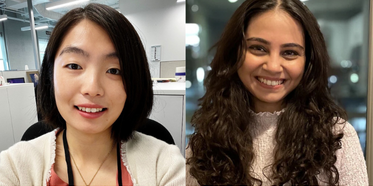
Left: Hansol Lee, MSE Alumna Right: Shruti Venkatram, MSE Almuna
MSE alumnae, Hansol Lee and Shruti Venkatram, have been named to the inaugural class of Polymeric Materials: Science and Engineering (PMSE) Breakthroughs in Polymers (BIP), a new recognition from the American Chemical Society’s Division of PMSE. This honor highlights early-career researchers whose innovative work is shaping the future of polymer science and technology, underscoring the impact of Lee and Venkatram’s contributions in advancing materials research.
In March of 2025, PMSE Chair, Cristina Thomas, announced a new forum for industry, government, and non-academic organizations. The BIP forum convened in Washington, DC, in mid-August. The forum focused on advancing the professional development of early-career polymer scientists and engineers to enhance interactions between emerging leaders by “bringing them together to discuss current challenges and opportunities in polymer science, materials, and engineering,” according to Thomas on the PMSE website.
Lee’s first involvement with PIMSE was in 2019 when she attended to American Chemical Society (ACS) Conference. There she delivered the order presentation and presented at the PMSE session. Venkatram has been a part of PMSE for about three years. She gained her connection through her current workplace, 3M. In 2023, she organized a symposium that sat within PMSE: Industrial Speakers for Polymer Science.
Venkatram learned of her nomination into the inaugural class of PMSE Breakthroughs in Polymers by her former advisor, Professor Rampi Ramprasad. “The first contact was actually made through my advisor, who was very happy to nominate me if I was interested,” said Venkatram. “So my manager and my advisor both wrote nominations for me to be a part of this.”
Venkatram was “pleasantly surprised” and “super happy” when she learned of her acceptance. “There are two separate forums this year, and one of them is exactly what I do, which is data science for polymers,” Venkatram said.
Their journey at MSE shaped their future as inductees of this inaugural class. Lee began her PhD in 2014, working with Professor Tsukruk to research the structure and the property morphology relationship of ionic polymers. “My responsibility was to formulate different polymer solutions with various solvents and functional groups,” said Lee.
Her research is divided into two main areas: fundamental work and application-driven work. The fundamental work involved studying the structure–property–morphology relationships of ionic polymers. The application-driven research focused on using ionic polymers to create gel materials with both high ionic conductivity and strong mechanical properties.
Venkatram started her PhD in 2015. With an undergraduate degree in chemical technology, she credits her induction to MSE to Georgia Tech. “In a way, I was shifting gears when I came to Georgia Tech,” Venkatram said. “I had no exposure to computational materials science prior to joining Georgia Tech.”
Currently, Venkatram’s research relates to her current role at 3M as a Materials Data Scientist. Materials data science is a method to accelerate how material science research is done today. “The intersection of sort of material science and machine learning, having subject matter expertise really goes a long way,” Venkatram said.
Venkatram was a student in Ramprasad’s lab, where she learned a lot about polymer science and machine learning. “A lot of things I that I learned during my grad schoolwork are things I used today for industrial research, which is significantly harder to do,” said Venkatram. “Research in grad school is a lot about vigor and novelty… but in industry it’s about just being useful, so things have to apply to real life.”
Lee works as a Senior Research Engineer at 3M where she works in the corporate research analytical lab. She provides analytical support using her expertise in the imaging technique with the Atomic Force Microscope (AFM), which is the kind of research she was conducting as a student in MSE in Tsukruk’s lab.
Lee offers this piece of advice for current students: take classes outside of your comfort zone. “If you think there’s a certain class that is valuable to your overall future, then I highly recommend taking that opportunity,” Lee said. “When getting your PhD, you’re hyper-focused on your research, but your PhD is still a part of your education. Take the opportunity to learn new things.”